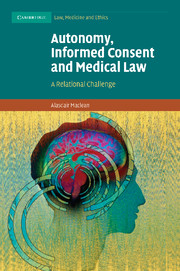Book contents
- Frontmatter
- Contents
- Table of cases
- List of figures
- Acknowledgements
- Introduction
- Part I An ethical model
- 1 Autonomy
- 2 The relevance of beneficence, justice and virtue
- 3 The healthcare professional–patient relationship: Setting the context for consent
- 4 The concept of consent: What it is and what it isn't
- Part II Consent and the law
- Summary and conclusion
- Bibliography
- Index
2 - The relevance of beneficence, justice and virtue
Published online by Cambridge University Press: 02 July 2009
- Frontmatter
- Contents
- Table of cases
- List of figures
- Acknowledgements
- Introduction
- Part I An ethical model
- 1 Autonomy
- 2 The relevance of beneficence, justice and virtue
- 3 The healthcare professional–patient relationship: Setting the context for consent
- 4 The concept of consent: What it is and what it isn't
- Part II Consent and the law
- Summary and conclusion
- Bibliography
- Index
Summary
In Chapter 1 I considered the concept of autonomy, which through its relationship to agency may be seen as the driving force of consent. However, autonomy is not the sole guiding principle. In this chapter, I will examine other moral principles and approaches that may be relevant to determining how the law should regulate consent to medical treatment. Rather than attempt to provide a complete model of how the different concerns interact I will in this chapter focus on the relevance of beneficence, justice and virtue in order to provide sufficient background to enable the subsequent development of a more textured model.
I have little to say about the principle of non-maleficence, the essence of which is to do no harm. As Szasz noted, this is – if taken too literally – ‘an absurd’ prescription. Much of what the professional does necessarily risks or causes harm and the obligation is, if interpreted literally, an impossible one. It makes better sense to consider the obligation in tandem with the duty of beneficence. An alternative approach is to use a normative concept of harm that requires the act to be both harmful and wrong. Most of the specific duties that arise from this, such as the obligations not to kill, cause injury or pain are relevant only in so far as consent provides the necessary justification to prevent the act being wrongful.
- Type
- Chapter
- Information
- Autonomy, Informed Consent and Medical LawA Relational Challenge, pp. 48 - 71Publisher: Cambridge University PressPrint publication year: 2009



